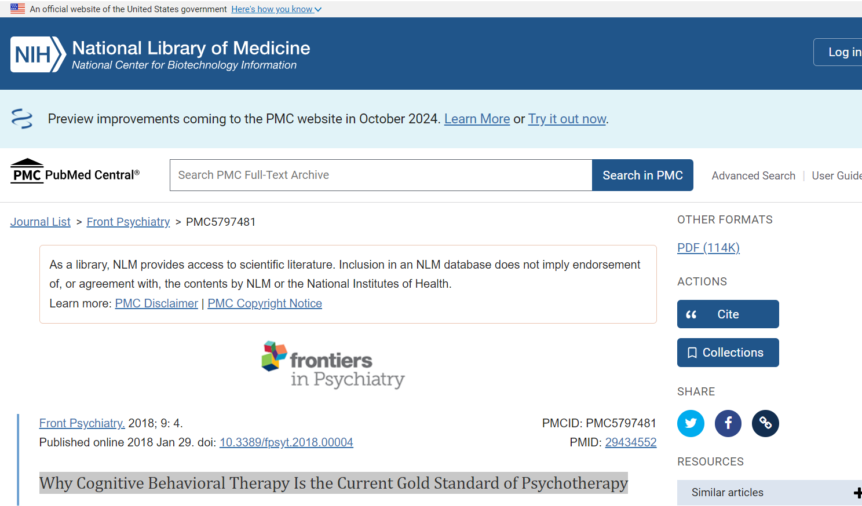Super cool thing (according to David D. Burns, MD): Cognitive Behavioral Therapy (CBT) is almost as effective when self-taught as when used by a therapist…
CBT, for me, is the age-old maxim: Don’t sweat the small stuff. It’s all small stuff. But how? How are we not going to get upset? CBT says, “stop distorting.”

Original article: https://www.ncbi.nlm.nih.gov/pmc/articles/PMC5797481
Summary: Cognitive Behavioral Therapy (CBT) is widely recognized in psychotherapy for its research foundation and widespread use in settings. Many consider it the standard to beat due to its effectiveness in addressing health concerns. CBT operates on the belief that our thoughts, emotions, and actions are interconnected and that changing thought patterns can result in improved well-being.
While some critiques exist about the quality of CBT studies and how they compare to treatment methods, CBT maintains its reputation as a leading approach. Some argue that studies often compare CBT to controls, such as wait lists, which may not fully test its efficacy against more involved treatments.
Over time, CBT has expanded its techniques and strategies to cater to disorders and patient needs. It now offers an approach that considers individual psychological processes. This evolution has kept CBT at the forefront of research and practice by incorporating discoveries into its methodology.
The flexibility of this approach. The extensive research backing it has solidified its position in treatment guidelines.
These recommendations often suggest using CBT as the treatment for disorders ranging from depression and anxiety to more intricate psychological conditions. This does not demonstrate its effectiveness. It also reflects the clinical community’s trust in its therapeutic advantages.
Moreover, CBT’s impact goes beyond its techniques. It acts as a standard for developing and assessing forms of treatments. Novel therapies are frequently compared to the effectiveness of CBT, which establishes it as a model in research.
Although CBT has an established position, it is not without its obstacles. Critics contend that there is still room for enhancement, especially concerning how it addresses and caters to patients’ requirements. Some individuals do not respond well to CBT. They may encounter setbacks, highlighting the need for enhancements and adjustments in therapy.
Advocates of CBT propose that the future of psychotherapy lies in an integrated strategy where principles of CBT could be combined with therapeutic components to boost effectiveness and tackle the shortcomings observed in conventional CBT practices. By doing this, psychotherapy can progress into a field that treats various mental health issues more efficiently and tailors treatment at an individual level, ensuring that each patient receives personalized care tailored to their specific needs.
The concept of a psychotherapy framework highlights how CBT evolves and impacts the field with its forward-thinking approach.

